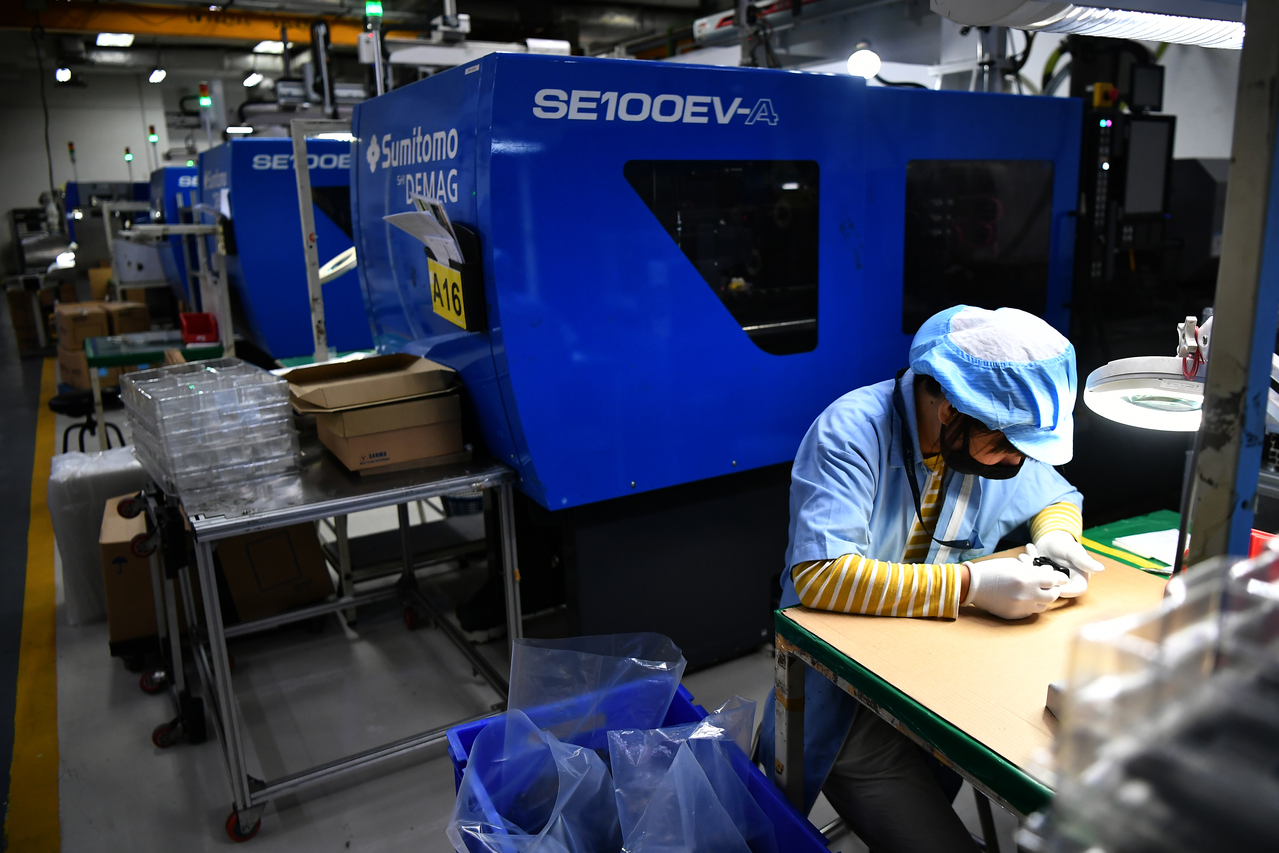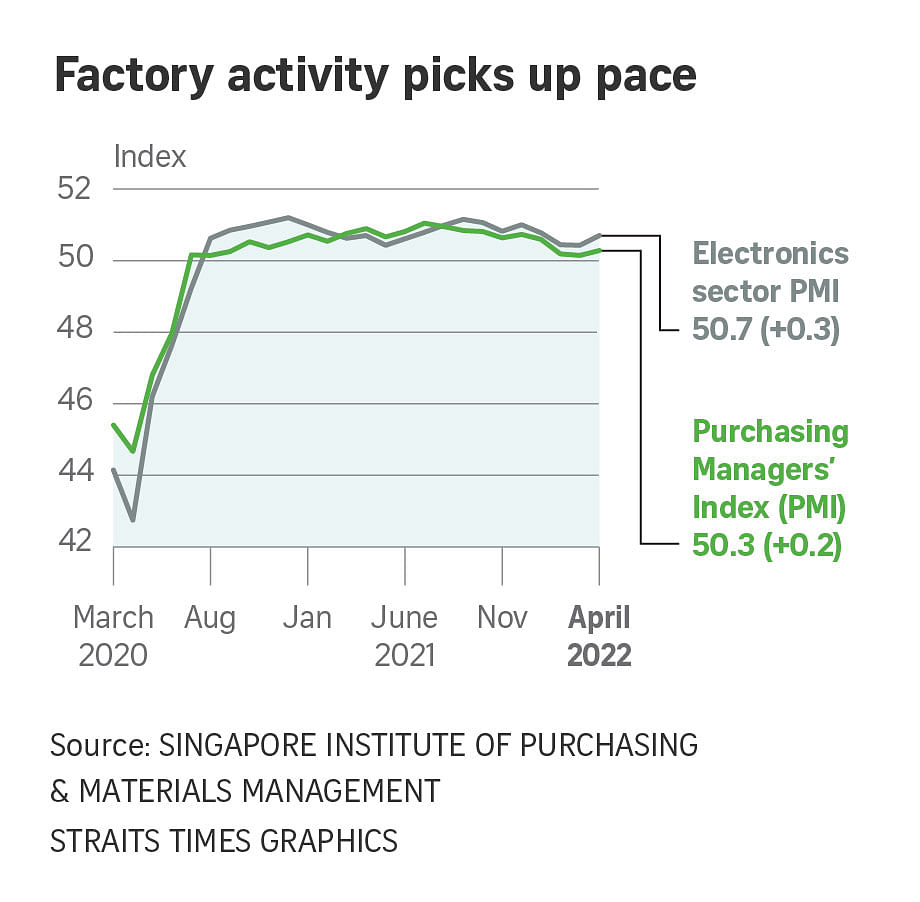S'pore manufacturing picks up pace, defying China lockdowns and Ukraine war
Sign up now: Get ST's newsletters delivered to your inbox

The April PMI ends a three-month slowdown in the pace of expansion from 50.7 points in December 2021.
PHOTO: ST FILE
Follow topic:
SINGAPORE - Factory activity in Singapore picked up pace in April, posting a 22nd month of consecutive expansion, despite the disruptions caused by Covid-19 lockdowns in China and the war in Ukraine reverberating across global supply chains.
The purchasing managers' index (PMI), a key barometer of the Republic's manufacturing economy, came in at 50.3 points, up 0.2 point from March, said the Singapore Institute of Purchasing and Materials Management (SIPMM) on Wednesday (May 4).
A reading above 50 indicates growth while one below 50 signals contraction.
The April PMI also ended a three-month slowdown in the pace of expansion from 50.7 points in December 2021.
The electronics sector PMI posted an even bigger increase of 0.3 point from March to record a faster rate of expansion at 50.7. The sector has now been in expansion territory for 21 months in a row.
Ms Sophia Poh, SIPMM vice-president for industry engagement and development, said the latest PMI readings bode well for the manufacturing sector despite the challenging environment in the global markets.
"There appears to be no end in sight to the Russia-Ukraine conflict, and local manufacturers are increasingly concerned about the rising energy cost, supply disruptions and inflationary pressures," she said.
SIPMM said the latest reading for the overall manufacturing sector was attributed to faster expansion rates in new orders, new exports, factory output, employment, and a slower contraction rate in the inventory index.
Imports, input prices and order backlog also posted faster expansion rates, whereas supplier deliveries posted a slower expansion rate and finished goods contracted at a slightly faster rate.
The April reading for the electronics sector was attributed to faster expansion rates for new orders, new exports and employment.
Factory output index recovered from a contraction, while the inventory index posted a slower contraction. Faster expansion rates were also recorded for imports, input prices and order backlog.
Both the indexes of supplier deliveries and finished goods posted faster contraction rates.

Singapore's robust manufacturing performance in April was in line with similar PMI gains by some of its Asian peers.
For instance, South Korea's PMI, compiled by S&P Global, climbed to 52.1 in April, rebounding from 51.2 in March. PMI for the Philippines recorded its best performance since November 2017, and readings also advanced in Australia, Indonesia and Thailand.
In contrast, the PMI for the European Union was at a 15-month low of 55.5 as shortages of components and a sharp slowdown in new orders were aggravated by the Chinese lockdowns and the war in Ukraine.
The US manufacturing ISM index also dropped to 55.4 from 57.1 as demand conditions are moderating while supply chains remain snarled and the labour market remains tight.
China's manufacturing sector is on the brink of recession as lockdowns close factories and disrupt supply chains. The PMI slipped to 47.4 in April – its lowest since February 2020 – from 49.5 in March, said the country's National Bureau of Statistics.
Given the downside risks from the three top trading partners, analysts doubted if April's jump in Singapore's PMI can be sustained.
Ms Selena Ling, chief economist at OCBC Bank, said manufacturing and electronics PMIs did spring a surprise rebound for April, but it is too early to say that the road ahead will be smooth sailing as yet.
"With China persisting with its Covid-19 lockdown strategy and the ongoing Ukraine war, the challenges may lie more on the supply side with very real price pressures even if global demand conditions hold up," she said, referring to the input prices for the manufacturing sector, a key component of the PMI.
SIPMM said input prices sub-index increased to 52.1, the highest since October 2013 when it was at 53. Meanwhile, the same sub-index for the electronics sector also accelerated to 52.5 from 52.3 in March, suggesting that imported inflation remains a real challenge, especially with energy prices remaining buoyant.
Ms Ling said Singapore's manufacturing sector may suffer a moderating growth momentum in the second quarter of 2022, especially because of a higher base set in the period from May to August 2021.
She said the recent business expectations survey for the manufacturing sector also pointed to softening momentum, with only 2 per cent of companies in the survey saying they are upbeat about the April to September outlook.
OCBC expects full-year 2022 manufacturing growth to come in at around 3.5 per cent.
The sector grew by 13.2 per cent in 2021, accelerating from the 7.5 per cent growth in 2020 when the economy was in recession.

